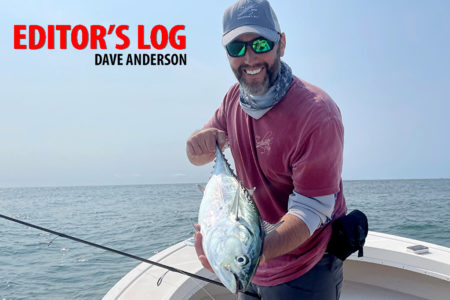The sight of dying or dead bunker has become fairly commonplace around many parts of the Island, and is occurring in coastal waters from South Jersey to Rhode Island. Readers and viewers continue to reach out in search of the cause of the most recent die offs as environmental agencies across several states seek to confirm the suspected Vibrio bacteria as the culprit. The following is the latest information from New York’s Department of Environmental Conservation.
DEC and neighboring state agencies have been investigating, monitoring, and tracking this mortality event for Atlantic menhaden (Brevoortia tyrannus) extending from Rhode Island to New Jersey since the fall of 2020. This spring, DEC received increasing reports of dead and dying Atlantic menhaden around Long Island and in the Hudson River. Recent samples collected by DEC and processed by Stony Brook University Marine Animal Disease Laboratory confirmed the presence of Vibrio bacteria in both live and dead fish. The same Vibrio bacterium species, which naturally occurs in coastal waters, was found in menhaden samples collected by the New Jersey Department of Environmental Protection and tested at Pequest Aquatic Animal Health Laboratory earlier this month.
Earlier samples of menhaden tissue were sent to Stony Brook University’s Marine Animal Disease Laboratory and Cornell University in fall 2020 to test for a viral infection often associated with the observed irregular swimming behavior. NJDEP also sent samples of menhaden to Pequest Aquatic Animal Health Laboratory. Samples of menhaden collected in both New York State and New Jersey tested negative for the virus.
Recent analysis of fish tissue by DEC and New Jersey Department of Environmental Protection (NJDEP), Division of Fish and Wildlife found elevated levels of Vibrio spp. bacteria in live and dead samples of menhaden. Vibrio bacteria naturally occur in the marine environment and are frequently found in higher concentrations during the summer when water temperatures rise. The specific bacterium identified is not typically known to be harmful to humans. However, as a precaution, DEC recommends treating the situation the same as with any dead, wild animal. If someone needs to come in contact with dead fish to clean them up, be sure to wear appropriate protective equipment, including gloves.
There have been no reports of other fish or wildlife species impacted by the suspected bacterium causing this mortality event, and it is still safe to eat fish that prey on menhaden. As always, all fish and shellfish should be cooked to the proper temperature and fish that are dead or appear sick should not be collected or eaten.
DEC continues to work with state and regional partners to further investigate this mortality event and request reports of marine fish kills, including location details and photos or videos. Information can be reported by emailing [email protected] or by calling 631-444-0714 for marine waters, and 845-256-3199 for the Hudson River.
Mortality events of menhaden are not unusual and there are various naturally occurring causes for these events. Fish that swim in large schools, such as bunker, are particularly vulnerable to low dissolved oxygen, changing environmental conditions, and pathogens. Die off events for menhaden attributed to low-dissolved oxygen are more common during the summer when water temperatures are high. However, they are also susceptible to “cold shock” when the temperature changes rapidly which can also cause mortality.
In May 2015 a large-scale die-off event of menhaden in the Peconic River was investigated by DEC and Suffolk County Department of Health Services. The primary cause of this die-off was low dissolved oxygen supply in the river, but the presence of toxic algae may also have been a factor. Additional research from Cornell University suggests disease in addition to predator-induced anoxia and algal blooms may be potential causes of that particular die-off.



